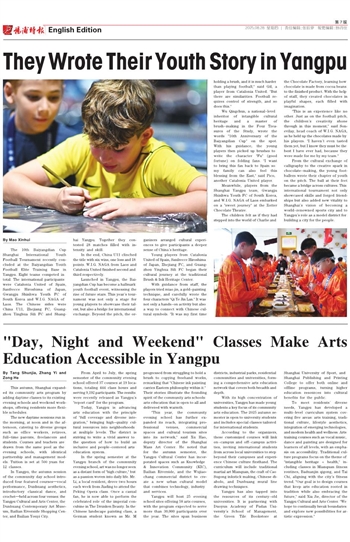By Tang Shunjia, Zhang Yi and Zong He
This autumn, Shanghai expanded its community arts program by adding daytime classes to its existing evening schools and weekend workshops, offering residents more flexible schedules.
The new daytime sessions run in the morning, at noon and in the afternoon, catering to diverse groups such as office workers, retirees, full-time parents, freelancers and students. Courses and teachers are drawn from the same pool as the evening schools, with identical partnership and management models. Tuition is set at 500 yuan for 12 classes.
In Yangpu, the autumn session of the community day school introduced four featured courses—vocal performance, Dunhuang aesthetics, introductory classical dance, and crochet—held across four venues: the Yangpu Cultural and Arts Center, the Dunhuang Contemporary Art Museum, Bailian Riverside Shopping Center, and Bailian Youyi City.
From April to July, the spring semester of the community evening school offered 37 courses at 19 locations, totaling 444 class hours and serving 9,192 participants. The results were recently released as Yangpu's "report card" for the program.
Today, Yangpu is advancing arts education with the principle of "full coverage and diverse integration," bringing high-quality cultural resources into neighborhoods at multiple levels. The district is striving to write a vivid answer to the question of how to build an inclusive and people-centered arts education system.
In the spring semester at the Yangpu branch of the community evening school, art was no longer seen as a distant form of "high culture," but as a passion woven into daily life. Mr. Li, a local resident, drove two hours each week from Jiading to attend the Peking Opera class. Once a casual fan, he is now able to perform the celebrated role of the imperial concubine in The Drunken Beauty. In the Chinese landscape painting class, a German student known as Mr. M progressed from struggling to hold a brush to copying freehand works, remarking that "Chinese ink painting carries Eastern philosophy within it." Their stories illustrate the founding spirit of the community arts schools: arts education that is open to all and delivered with warmth.
"This year, the community evening school has further expanded its reach, integrating professional venues, commercial spaces and cultural tourism sites into its network," said Xu Hao, deputy director of the Shanghai Mass Art Center. He noted that for the autumn semester, the Yangpu Cultural Center has incorporated spaces such as Knowledge & Innovation Community (KIC), Bailian Riverside, and the Wujiaochang commercial district to create a new urban cultural model that combines technology, industry and services.
Yangpu will host 25 evening school sites offering 58 arts courses, with the program expected to serve more than 30,000 participants over the year. The sites span business districts, industrial parks, residential communities and universities, forming a comprehensive arts education network that covers both breadth and depth.
With its high concentration of universities, Yangpu has made young students a key focus of its community arts education. The 2025 autumn semester is open to university students and includes special classes tailored for international students.
According to the organizers, these customized courses will link on-campus and off-campus activities, inviting international students from across local universities to step beyond their campuses and experience Chinese culture firsthand. The curriculum will include traditional martial art Mianquan, the craft of Cao Sugong inkstick making, Chinese diabolo, and Dunhuang mural line drawing techniques.
Yangpu has also tapped into the resources of its century-old universities. It is partnering with Duoyun Academy of Fudan University's School of Management, the Green Tile Bookstore at Shanghai University of Sport, and Shanghai Publishing and Printing College to offer both online and offline programs, turning higher education resources into cultural benefits for the public.
To meet residents' diverse needs, Yangpu has developed a multi-level curriculum system covering five areas: arts training, traditional culture, lifestyle aesthetics, integration of emerging technologies, and modern health and wellness. Arts training courses such as vocal music, dance and painting are designed for learners of all levels, with an emphasis on accessibility. Traditional culture programs focus on the theme of "intangible heritage + health," including classes in Mianquan fitness routines, Baduanjin qigong, and Tai Chi, aligning with the city's fitness trend. "Our goal is to design courses that keep arts education rooted in tradition while also embracing the future," said Xia Jie, director of the Yangpu Cultural and Arts Center. "We hope to continually break boundaries and explore new possibilities for artistic expression."

